
Molecular Cytogenetics
Scope & Guideline
Bridging the Gap Between Genetics and Cellular Mechanisms.
Introduction
Aims and Scopes
- Prenatal and Perinatal Genetics:
The journal extensively covers research on prenatal diagnosis, including non-invasive prenatal testing (NIPT) and its implications for detecting chromosomal abnormalities in fetuses. - Cancer Genomics and Cytogenetics:
There is a significant focus on the cytogenomic characterization of various cancers, exploring chromosomal abnormalities and their prognostic implications in hematological malignancies and solid tumors. - Clinical Case Studies and Reports:
The journal publishes numerous case reports that detail unique cytogenetic findings and their clinical significance, providing insights into rare genetic disorders. - Technological Advancements in Cytogenetics:
Research on novel molecular cytogenetic techniques, such as chromosomal microarray analysis and optical genome mapping, is frequently featured, highlighting their applications in clinical settings. - Genotype-Phenotype Correlations:
The journal emphasizes studies that connect specific chromosomal abnormalities with clinical features, aiding in understanding the phenotypic manifestations of genetic disorders.
Trending and Emerging
- Non-Invasive Prenatal Testing (NIPT):
NIPT is increasingly prominent, with numerous studies exploring its efficacy and clinical implications for prenatal diagnosis, reflecting its growing acceptance in clinical practice. - Complex Genomic Rearrangements:
There is a notable trend towards investigating complex genomic rearrangements, particularly in the context of cancer and genetic disorders, signaling a deeper exploration of chromosomal instability. - Mosaicism and Uniparental Disomy:
Research on mosaicism and uniparental disomy is gaining attention, with an emphasis on their clinical significance and implications for prenatal diagnostics. - Integration of Genomic Technologies:
The journal is increasingly featuring studies that integrate various genomic technologies, such as SNP arrays and whole-genome sequencing, to enhance diagnostic accuracy and understanding of genetic conditions. - Cohort Studies in Specific Populations:
There is a growing focus on cohort studies that investigate genetic conditions within specific populations, providing valuable insights into population-specific genetic disorders.
Declining or Waning
- Traditional Karyotyping:
There seems to be a waning interest in classical karyotyping techniques as newer, more precise molecular methods gain traction in clinical diagnostics. - General Cytogenetic Techniques:
The frequency of publications solely focused on standard cytogenetic techniques, without molecular advancements, has decreased, indicating a shift towards more integrated approaches. - Broad Population Studies:
Research focusing on broad population-based cytogenetic studies, without specific clinical applications or technological advancements, appears to be less common in recent issues.
Similar Journals

CHROMOSOME RESEARCH
Driving innovation in genetics with peer-reviewed excellence.CHROMOSOME RESEARCH is a prestigious academic journal dedicated to advancing the field of genetics, published by SPRINGER. Operative since 1993, this journal is widely recognized for its contributions to the understanding of chromosomal dynamics, genetic interactions, and molecular biology, maintaining a significant impact factor that places it in the Q2 category within its field as of 2023. Despite being a non-open access publication, CHROMOSOME RESEARCH provides essential insights and peer-reviewed articles that are invaluable to researchers, professionals, and students alike, with continual publication through the convergence years stretching towards 2024. Furthermore, with a Scopus rank of #187 out of 347 in the Genetics category, it resides in the 46th percentile, epitomizing its relevance and scholarly rigor within the scientific community. For those engaged in the intricate study of genetics and chromosomal studies, CHROMOSOME RESEARCH remains a crucial resource for disseminating pivotal research findings and facilitating academic discourse.
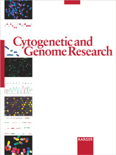
CYTOGENETIC AND GENOME RESEARCH
Exploring the depths of genetic research for a healthier future.CYTOGENETIC AND GENOME RESEARCH is a pivotal journal dedicated to the exploration of cytogenetics, genomics, and their applications within clinical genetics and molecular biology. Published by KARGER in Switzerland, this journal aims to foster comprehensive discussions and disseminate impactful research from diverse fields related to genetics. It operates under an open access model, ensuring that researchers, professionals, and students can easily access and contribute to the latest findings. With coverage spanning from 1962 to 2024, CYTOGENETIC AND GENOME RESEARCH continues to serve as a vital resource, despite its current categorization in the Q4 quartile across Genetics and Molecular Biology. It provides an avenue for advancing the understanding of genomic mechanisms and their implications for human health. The journal encourages submissions that delve into cutting-edge methodologies, data interpretation, and theoretical frameworks, thereby playing a crucial role in the advancement of genetic research and its clinical applications.
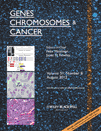
GENES CHROMOSOMES & CANCER
Transforming Cancer Research with Genetic Discoveries.GENES CHROMOSOMES & CANCER, published by Wiley, is a premier journal in the intertwined fields of cancer research and genetics. With an ISSN of 1045-2257 and an e-ISSN of 1098-2264, this journal has been a significant outlet for innovative research since its inception in 1989, continuing through to 2024. Positioned in the Q2 quartile of both Cancer Research and Genetics categories in 2023, it reflects a strong impact in the scientific community, as evidenced by its Scopus rankings—99th in Genetics and 83rd in Cancer Research. Though it does not provide open access options, GENES CHROMOSOMES & CANCER offers valuable insights that foster collaboration and discovery among researchers, professionals, and students dedicated to understanding the genetic underpinnings of cancer. With its reputable standing, this journal is a vital resource for those aspiring to contribute meaningful advancements in cancer genetics and therapeutic interventions.
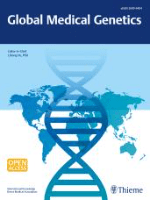
Global Medical Genetics
Bridging the Gap Between Genetics and Clinical PracticeGlobal Medical Genetics is a premier open-access journal dedicated to advancing the field of medical genetics. Published by GEORG THIEME VERLAG KG, this journal has been providing a dynamic platform for disseminating cutting-edge research and clinical findings since its inception in 2020. With the ISSN 2699-9404, it serves as an essential resource for researchers, healthcare professionals, and students who seek to explore the complex interplay between genetics and medicine. The journal aims to foster collaboration and innovation in the genetics community, addressing a diverse range of topics from genetic disorders to the application of genomics in personalized medicine. By providing open access to its content, Global Medical Genetics enhances knowledge sharing and accelerates advancements in healthcare, making it a vital asset for anyone invested in the future of genetics.
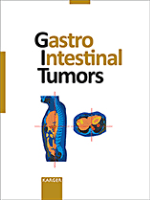
Gastrointestinal Tumors
Innovating Insights into Gastrointestinal HealthGastrointestinal Tumors is a reputable, peer-reviewed journal dedicated to advancing knowledge in the field of gastrointestinal oncology. Published by KARGER, this journal has been a pivotal platform since its transition to Open Access in 2014, ensuring that research findings are accessible to a global audience of researchers, clinicians, and students engaged in this vital area of study. With an emphasis on innovative research, clinical studies, and comprehensive reviews, Gastrointestinal Tumors aims to bridge gaps in knowledge and foster discussions that will inform and enhance clinical practices. The journal's commitment to excellence reflects the rising importance of gastrointestinal health in medical research, making it an essential resource for anyone seeking to stay at the forefront of this rapidly evolving field. Based in Basel, Switzerland, it is positioned within a strong academic community, and continues to influence the landscape of gastrointestinal cancer research.

Reproductive Medicine
Fostering Dialogue and Discovery in Fertility ScienceReproductive Medicine is an esteemed open-access journal published by MDPI, focusing on the latest research and advances in reproductive health, fertility, and assisted reproductive technologies. With its E-ISSN of 2673-3897, the journal aims to provide a platform for researchers, clinicians, and healthcare professionals to disseminate their findings, share innovative practices, and engage in scholarly discourse. Situated in Basel, Switzerland, Reproductive Medicine emphasizes a multidisciplinary approach, exploring biological, clinical, and psychological aspects of reproductive health. Although the journal is in the early stages of establishing metrics such as H-index and Scopus rankings, its open-access model enhances accessibility, allowing for a broad dissemination of knowledge. Committed to fostering advancements in the field, Reproductive Medicine is essential for those seeking to stay at the forefront of reproductive health research.

Journal of Hematology & Oncology
Unlocking Innovations in Blood Disorders and Cancer ResearchJournal of Hematology & Oncology, published by BMC, is a leading open-access journal dedicated to the dynamic fields of hematology and oncology, with a continuous publication record since 2008. Based in the United Kingdom, this prestigious journal provides a platform for groundbreaking research, encompassing topics that span cancer research, hematological disorders, and molecular biology. With a remarkable Q1 ranking in multiple categories including Cancer Research, Hematology, Molecular Biology, and Oncology for 2023, it stands as a significant contributor to the scientific community. The journal's rigorous peer-review process ensures the dissemination of high-quality studies that drive advancements in these critical areas of medicine, boasting an impressive Scopus rank in the top echelons of its fields. As an open-access publication, it promotes widespread accessibility and sharing of knowledge, making it an indispensable resource for researchers, clinicians, and students striving to make advancements in understanding and treating hematological and oncological diseases.
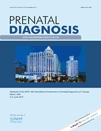
PRENATAL DIAGNOSIS
Leading the Way in Prenatal Research ExcellencePRENATAL DIAGNOSIS is an esteemed journal dedicated to the fields of genetics and obstetrics, published by Wiley. With an ISSN of 0197-3851 and E-ISSN of 1097-0223, this journal has been a leading platform for the dissemination of pioneering research since its inception in 1980. Operating from its base in the United Kingdom, PRENATAL DIAGNOSIS has achieved notable recognition, attaining a Q2 category in Genetics (Clinical) and a prestigious Q1 category in Obstetrics and Gynecology as of 2023. It ranks 41st out of 209 in Obstetrics and Gynecology and 40th out of 99 in Clinical Genetics according to Scopus, placing it in the 80th and 60th percentiles, respectively. This journal provides a critical resource for researchers, healthcare professionals, and students who are focused on advancing the science of prenatal diagnosis and its application in clinical practice. While not an open access journal, the content is pivotal for those aiming to engage with the most current findings and methodologies in prenatal care. As it looks toward 2024 and beyond, PRENATAL DIAGNOSIS continues to strive for excellence in fostering breakthroughs that impact maternal and fetal health.
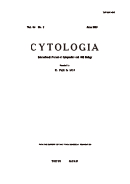
CYTOLOGIA
Advancing Knowledge in Cell Biology and GeneticsCYTOLOGIA is a prominent academic journal published by University of Tokyo Cytologia, specializing in the fields of Animal Science, Plant Science, Cell Biology, and Genetics. With origins dating back to 1929, this journal has been at the forefront of cytological research and continues to contribute to advancements in both basic and applied sciences. As of 2023, it holds a respectable position in various Scopus categories, with a Q3 ranking in Animal Science and Zoology and Plant Science, alongside Q4 rankings in Genetics and Cell Biology, reflecting its dedication to quality research dissemination. While currently not an Open Access journal, CYTOLOGIA provides critical insights and findings that are pivotal for researchers, professionals, and students aiming to further their understanding of cytology and its applications in diverse biological fields. With a historical legacy and ongoing relevance, CYTOLOGIA remains a vital resource for anyone engaged in cutting-edge research or seeking comprehensive knowledge in the biological sciences.

Molecular Genetics & Genomic Medicine
Transforming discoveries into clinical applications.Molecular Genetics & Genomic Medicine, published by WILEY, is an esteemed and open-access journal that has been a prominent source of knowledge in the fields of genetics and molecular biology since its establishment in 2013. With an ISSN of 2324-9269, it aims to provide a platform for the dissemination of novel findings and innovative research that pushes the boundaries of genomics and its clinical applications. The journal holds a Q3 categorization in Genetics, Clinical Genetics, and Molecular Biology, reflecting its growing influence in these disciplines, as evidenced by its Scopus rankings. Researchers, professionals, and students alike will find valuable insights and advancements in genomic medicine, making this journal an essential resource for those dedicated to the understanding and application of genetic and molecular research in healthcare. Located at 111 River St, Hoboken, NJ, Molecular Genetics & Genomic Medicine continues to foster a global dialogue within the scientific community, ensuring accessible knowledge for all.